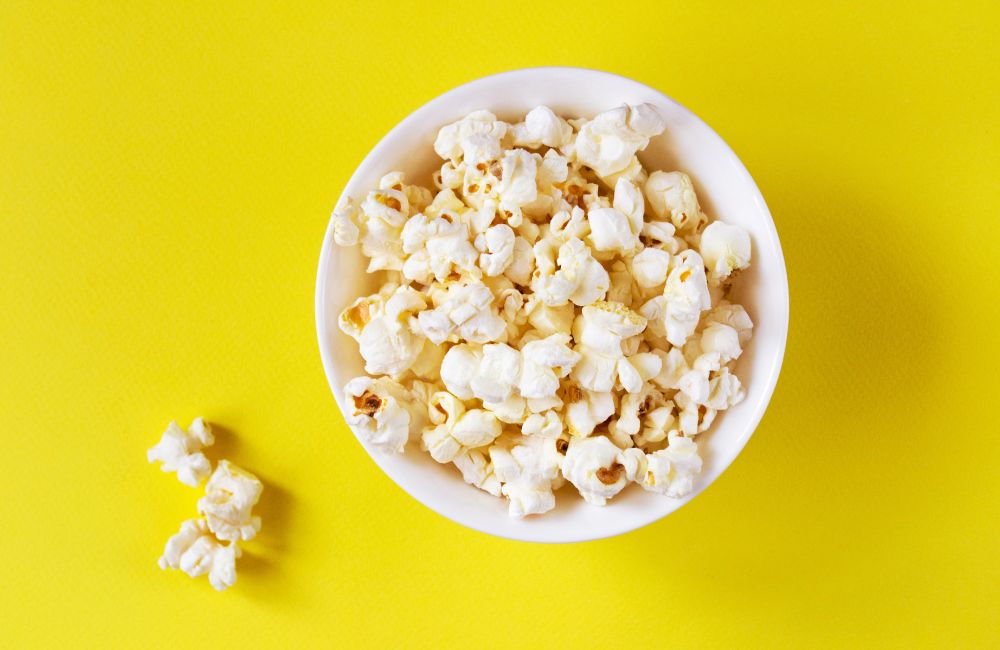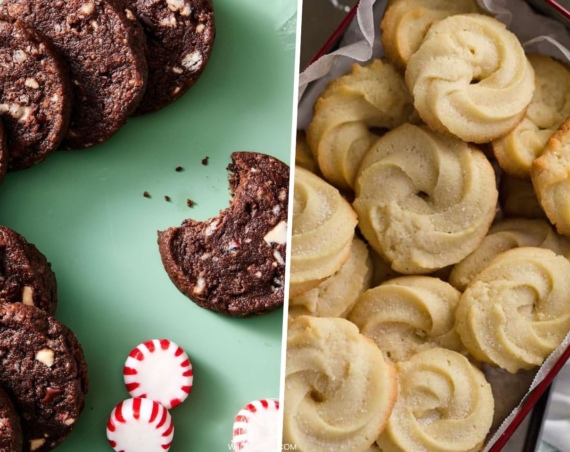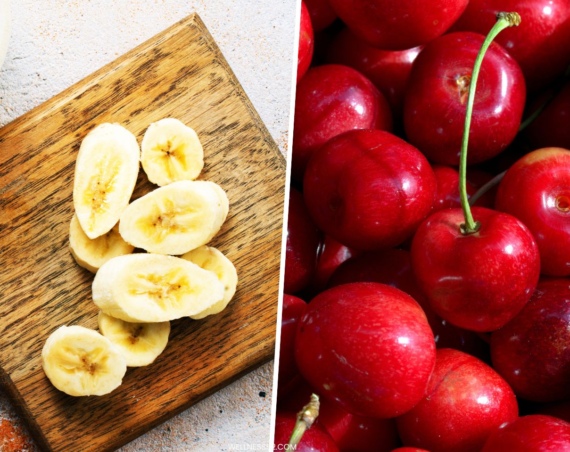
What’s not to love about popcorn?
It’s an easy, healthy snack, perfect for taking on the go or for a movie night. Plus it’s low in calories and high in fiber.
Of course, we’re talking about air-popped popcorn or popcorn that has been heated in healthy, high-temperature cooking oil.
Not popcorn that is coated in unhealthy fats or sugar like kettle corn or the movie popcorn you get at a theater.
But, is popcorn keto-friendly? Does it qualify as a keto snack? The answer depends on your daily carb limit.
On a true ketogenic diet, carbohydrates are severely restricted to 5% of calorie carbs, with the goal of entering the body into a state of ketosis.
This most restrictive phase of a ketogenic diet is typically followed for only a short period of time, and will likely not include any grains, like popcorn, on the meal plan.
However, most people follow a modified version of a keto diet, which allows for more flexibility with carbs.
A modified keto diet typically aims for less than 50 grams of net carbs per day. Targeted and cyclical keto diets also provide for more flexibility with carb intake.
On these types of low-carb diets, popcorn can definitely fit into your daily carb limit.
What Is Popcorn?
Popcorn is popular snack food, enjoyed by people for thousands of years.
How does a little hard corn kernel make its magical transformation into popcorn?
Each corn kernel contains a tiny amount of water that converts into steam when heated.
Ultimately, the hard outer shell reaches its pressure point and the kernel explodes, resulting in a spongy white flake of popcorn.
Popcorn is classified as a whole grain food because it contains the entire grain kernel — the bran, germ, and endosperm.
Because whole grains are nutrient and fiber dense, they may reduce the risk of many major diseases, such as cancer, heart disease, hypertension, and diabetes.
There are two main methods to make popcorn — wet and dry.
The dry method uses just hot air to pop the popcorn kernels, which you can do on the stovetop, in a hot air popper machine, or in the microwave.
The wet method uses hot oil to help distribute the heat and pop the corn kernels. This method can also be done on the stovetop.
If you prefer this method, make sure to use a high-temperature cooking oil like avocado or refined coconut oil. You can also use ghee, which is clarified butter.
Nutrition Facts
1 cup of air-popped popcorn (1).
- 30 calories
- 0.4 g fat
- 1 g protein
- 1.2 g fiber
- 6.2 g total carbs
- 5 g net carbs
3 Cups of Air-Popped Popcorn
- 90 calories
- 1 g fat
- 3 g protein
- 3.6 g fiber
- 18.6 g total carbs
- 15 g net carbs
- 9% of the Reference Daily Intake (RDI) for magnesium
- 9% of the RDI for phosphorus
- 12% of the RDI for manganese
- 6% of the RDI for zinc
Is Popcorn a Keto Snack?
If you are in the induction phase of a keto diet, snacks typically will be high-fat and very low-carb, such as eggs, avocados, cheese, nuts, and seeds.
During this phase, popcorn is not considered a good keto snack choice.
However, if you follow a modified, targeted, or cyclical keto diet then — at just 5 grams of net carbs per cup — popcorn can definitely work as an acceptable keto snack choice.
Be sure to check the nutritional information on any store-bought microwave popcorn and pre-popped bagged popcorn.
Avoid any types of popcorn products with added sugar, unhealthy fats, and preservatives.
Look for products with a short ingredients list, made with just salt and healthy vegetable oil, like coconut or olive oil.
Avoid movie theater popcorn altogether, since you have no way to control the amount and type of oil used. Instead, pop your own popcorn at home in your popcorn maker or on the stove and bring it with you to the movie theater.
Or, if you plan in advance, you can make keto popcorn out of cheese.
This process takes over 24 hours because you need to allow time for the cheese to dry out, but it’s worth it if you’re looking for a highly satisfying keto snack.
Best Ways to Add Flavor to Popcorn
Here is a great list of ways to season your bowl of popcorn without adding sugar:
- dried herbs and spices
- Rosemary
- paprika
- oregano
- basil
- parsley
- thyme
- dill
- garlic powder
- cayenne pepper
- nutritional yeast
- parmesan cheese (or other grated hard cheese)
- cinnamon
- black pepper
- coconut oil
- real butter or clarified butter (ghee)
Portion Size Matters
Keep in mind that 1 cup of popcorn contains 5 grams of carbs (net), so portion size does matter.
If you’re trying to stick with a 50-gram daily carb count, limit popcorn servings to 3 cups per day.
Stock up on other low-carb snacks at home just in case 3 cups of popcorn was not enough to satisfy your hunger.
Satisfying Snack Favorites on Keto
Here are some satisfying keto snack choices if you’ve hit your carb count limit for snacks:
- Nuts — Macadamia nuts and pecans are both good choices.
- Beef Jerky or Pork Rinds — Sometimes the saltiness of these low-carb snacks is just what you need to satisfy a hunger craving.
- Hard-boiled eggs — Hard-boiled eggs make for an easy, high-protein portable keto snack.
- Avocado —An entire small-medium avocado (136 g) nets just 2.5 grams of carbs. This superfood is packed with vitamins, minerals, heart-healthy omega fats, and fiber. All you need is a knife and a spoon to enjoy this low-carb treat.
- Cheese — Most cheese fits nicely into a keto diet, plus it’s a great way to get some extra calcium in your diet.
- Cottage cheese —Top a delicious cottage cheese bowl with toasted almonds or sunflower seeds that give you that satisfying crunch. Other great toppings or mix-in options include stevia sweetener, vanilla extract, coconut flour or flakes, almond flour, and cinnamon.
- Roasted Cauliflower — There’s a reason cauliflower is a keto fan favorite. It’s packed with nutrients, low-carb, and has a hearty texture that fills you up.
- Açaí bowl — Netting just 1 gram of carbs per serving (100 g) and loaded with nutrition, açaí berries are the nearly perfect food for a low-carb diet. Unfortunately, most store-bought açaí bowls are loaded with sugar, so it’s best to make your own keto-friendly açaí bowl at home. Make sure to use unsweetened frozen açaí puree blended with unsweetened almond milk and add a sweetener like stevia. Top with coconut flakes, hemp or chia seeds, and nut butter.
- Keto Popcorn — There are some amazing keto recipes online for keto popcorn, which is made with just cheese, not corn kernels. The downside is that it takes at least 24 hours for the cheese pieces to dry out before you bake them, but it’s worth the wait.
In the end, you have a delicious, low-carb, crunchy treat.
Bake a large enough batch so that you have this keto-friendly snack on hand throughout the week. Refrigerate in an airtight container.
Bottom Line
Popcorn makes for a delicious snack, plus it’s healthier than many alternatives and fits on many different popular diets, including gluten-free, paleo, low-carb, and vegetarian.
A 3-cup serving of air-popped popcorn is low-calorie and filled with gluten-free fiber and at 15 grams of net carbs, can fit into a modified, cyclical, or targeted keto diet.
Modified keto diets typically limit the number of carbs to 50 grams per day.
Because there are 15 grams of carbohydrates in 3 cups of popcorn, it is not the best snack food choice for those who are just beginning a keto diet with the goal of achieving ketosis.
Please note that in the short-term, nutritional ketosis is considered safe, however, there is limited research on the long-term effects.
This is why it is recommended to eventually transition to a sustainable, nutrient-dense, low-carb diet.
Certain groups of people are advised not to follow a ketogenic diet (2), including but not limited to people with type 1 diabetes, chronic kidney disease, concomitant use of SGLT‐2 inhibitors, pancreatic disease, liver conditions, cardiac arrhythmias, recent stroke, or myocardial infarction, heart failure, respiratory failure, thyroid problems, eating disorders, gallbladder disease, pregnant or breastfeeding women, and athletes. Always check with your doctor or dietitian first to make sure it is safe for you to start a keto diet.
- Food Data Central. U.S. Department of Agriculture. https://fdc.nal.usda.gov/index.html
- Wantanabe, M, et. al. “Scientific evidence underlying contraindications to the ketogenic diet: An update.” Obesity Treatment, 2020. Retrieved September 14, 2020 from https://onlinelibrary.wiley.com/doi/full/10.1111/obr.13053


